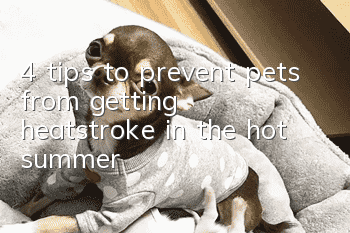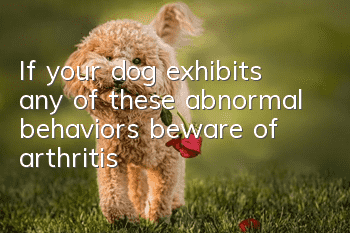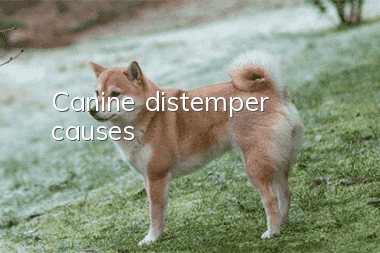4 tips to prevent pets from getting heatstroke in the hot summer

The weather is getting hotter and hotter, and pets also need to prevent heatstroke and cool down in summer! Here are some tips on pet heatstroke prevention, I hope it will be helpful to you! The climate is hot and the air is humid in summer. Pets in a high temperature and humid environment will lose body heat due to It is difficult and very easy to cause heatstroke, so you should prevent heatstroke and moisture.
The weather is getting hotter and hotter, and pets also need to prevent heatstroke and cool down in summer! Here are some tips on pet heatstroke prevention, I hope it will be helpful to everyone!
1. Dissipate heat promptly
The climate in summer is hot and the air is humid. Pets in hot and humid environments are prone to heat stroke due to difficulty in dissipating body heat, so they should be protected from heatstroke and moisture. Since the pet's sweat glands degenerate and it is difficult to dissipate heat, the pet house should be in a ventilated and dry place, avoid activities under the scorching sun, and go out for a walk every morning and evening. If your pet is found to have symptoms of heat stroke, such as difficulty breathing, elevated body temperature, rapid heartbeat, etc., you should immediately apply a cold compress to the pet's head with a wet towel, move it to a cool and ventilated place, and ask a pet doctor for treatment immediately.
In addition, friends who have cars are reminded not to lock their pets in the car, because the temperature inside the car is high in summer, the heat cannot be dissipated, and the air is not circulated, which can easily lead to death from lack of oxygen.
2. Air conditioning syndrome
Now that we are approaching the scorching summer heat, air conditioning usage in many households is extremely high. If people stay in an air-conditioned environment for a long time, they may suffer from air-conditioning disease, and pets may also suffer from air-conditioning disease. When a pet suffers from air-conditioning disease, the main symptoms are sneezing and runny nose, anorexia or even not eating or drinking. It looks similar to cold symptoms, but is actually much more serious than a cold. In severe cases, the body temperature rises and breathing and heart rate accelerate.
Pet owners are reminded not to let pets stay in air-conditioned rooms for long periods of time in summer. It is best to take them out in the morning or evening. Pets are strictly prohibited from sleeping under air-conditioning vents. Do not blow the air conditioner directly after giving your pet a bath.
3. Nutrition should be balanced
In summer, pets also lose a lot of water, so you should always pay attention to whether there is clean and sufficient water in their food bowls. Pets should be fed properly and there should be no leftovers. Moldy and spoiled food should be thrown away immediately. Do not feed your pets cold food directly from the refrigerator. This will greatly irritate their upper gastrointestinal tract and can easily cause imbalance of normal bacteria, endocrine disorders, and indigestion. Pet dogs also need foods other than meat, such as vegetables and fruits, which are beneficial to the health of pet dogs. Adult dogs should be fed once a day and puppies twice a day. Food should be rationed and tableware should be set.
4. Keep it clean at all times
In summer, pets should pay special attention to keeping them clean. Parasites cause bacterial folliculitis in the hair follicles or skin glands of pet dogs, resulting in hair loss and itching. In severe cases, the affected area may become red.Spots, pustules, and cortical thickening occur mainly in the lower abdomen, inner legs, neck, and chest. Pets tend to have excessive secretions near their eyes, so you should pay more attention to this. If there is a lot of secretion, you can flush it with saline. If you can't control it, seek medical attention. Pets’ ears should be cleaned regularly and checked for inflammation or black or greasy discharge. The color of the nose should be checked frequently. If there is a change, it may be a fever or cold. If you have pus-like discharge from your nose, you may have pneumonia or an infectious disease.
Medical guide tip: When bathing pets, use special pet bath liquid, which can not only remove odor, but also protect the hair and prevent external parasites from multiplying in the hair.
- How to raise a dog to be particularly loyal? Dog training tips!
- How to solve the problem of dogs causing destruction at home? The method is very important!
- Common Dog Diseases and Prevention
- How often should dogs be dewormed?
- How to tell if a dog is blind
- Why does a dog urinate blood? Poop shovelers should pay attention...
- What is the best medicine for Shiba Inu Kennel Cough?
- What can’t Bedlington Terriers eat?
- What is the most effective way for dogs to eat to gain weight?
- The dog's food-protecting behavior has a lot to do with its owner. How can it be improved?



